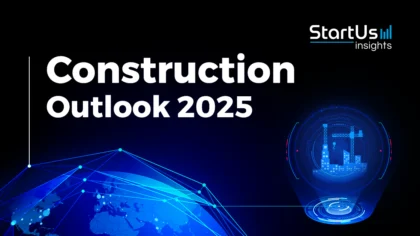Accelerate Productivity in 2025
Reignite Growth Despite the Global Slowdown
Emerging technologies in the construction industry are reshaping project planning, execution, and maintenance while addressing labor shortages and rising costs. Technologies like 3D printing simplify on-site construction by minimizing material waste and reducing labor costs, while artificial intelligence (AI) optimizes project management through real-time data analysis and decision-making. Further, augmented and virtual reality (AR/VR) tools enhance collaboration, allowing stakeholders to visualize designs and improve training methods.
Startups and scaleups are spearheading these advancements by providing solutions that are both scalable and industry-specific. Veristart Technologies, for instance, offers a cloud-based platform that centralizes operator data and manages equipment access to reduce operational risks, costs, and downtime. Similarly, Cosmic Robotics brings autonomous robotics to the construction site. For innovation managers, product developers, and business leaders, staying ahead of these emerging trends is critical to stay ahead of the curve as the industry is undergoing rapid technological shift.
Why should you read this report?
- Gain insights into the top 10 technologies impacting construction.
- Learn about three practical use cases for each technology.
- Meet 10 innovative startups advancing these technologies.
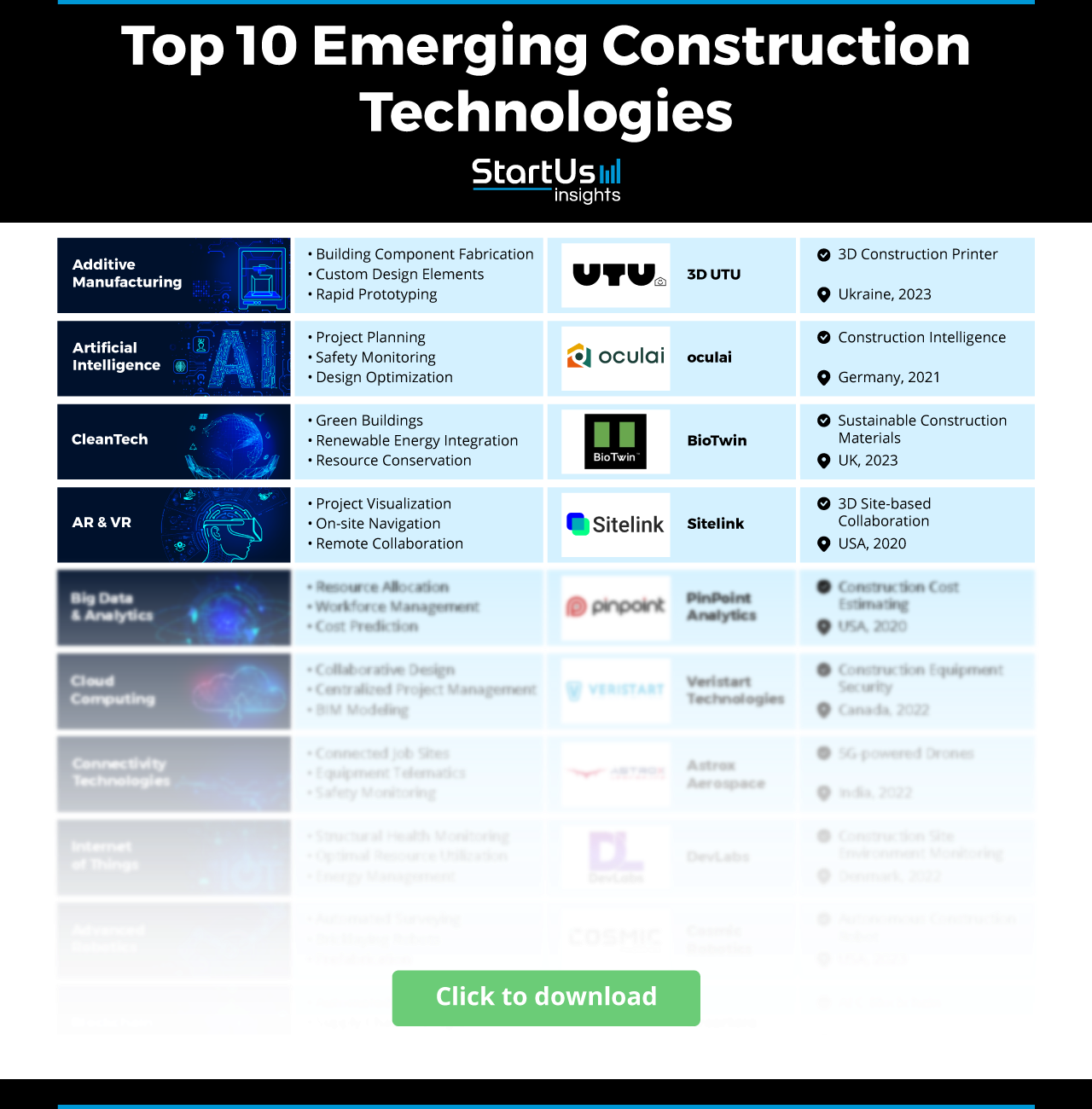
Key Takeaways
- Additive Manufacturing
- Use Cases:
- Building Component Fabrication
- Custom Design Elements
- Rapid Prototyping
- Startup to Watch: 3D UTU
- Use Cases:
- Artificial Intelligence
- Use Cases:
- Project Planning
- Safety Monitoring
- Design Optimization
- Startup to Watch: oculai
- Use Cases:
- CleanTech
- Use Cases:
- Green Buildings
- Renewable Energy Integration
- Resource Conservation
- Startup to Watch: BioTwin
- Use Cases:
- Augmented Reality & Virtual Reality
- Use Cases:
- Project Visualization
- On-site Navigation
- Remote Collaboration
- Startup to Watch: Sitelink
- Use Cases:
- Big Data & Analytics
- Use Cases:
- Resource Allocation
- Workforce Management
- Cost Prediction
- Startup to Watch: PinPoint Analytics
- Use Cases:
- Cloud Computing
- Use Cases:
- Collaborative Design
- Centralized Project Management
- Building Information Modeling (BIM)
- Startup to Watch: Veristart Technologies
- Use Cases:
- Connectivity Technologies
- Use Cases:
- Connected Job Sites
- Equipment Telematics
- Safety Monitoring
- Startup to Watch: Astrox Aerospace
- Use Cases:
- Internet of Things (IoT)
- Use Cases:
- Structural Health Monitoring
- Optimal Resource Utilization
- Energy Management
- Startup to Watch: DevLabs
- Use Cases:
- Advanced Robotics
- Use Cases:
- Automated Surveying
- Bricklaying Robots
- Prefabrication
- Startup to Watch: Cosmic Robotics
- Use Cases:
- Blockchain
- Use Cases:
- Automated Transactions
- Supply Chain Management
- Project Documentation
- Startup to Watch: Arcartera
- Use Cases:
Construction Industry FAQs
What are the challenges in the construction industry?
The construction industry faces several key challenges, including persistent labor shortages, supply chain disruptions, and increasing regulatory demands. Labor shortages continue to be a significant issue, with the industry needing to recruit an estimated 501000 additional workers in 2024 to meet demand.
Supply chain disruptions due to global events and material cost volatility further complicate project timelines and budgets. The industry must navigate complex regulatory environments, particularly safety and environmental sustainability.
Is the construction industry growing?
Despite facing challenges like economic uncertainty and fluctuating material costs, the global construction market is projected to grow from USD 10.4 trillion in 2023 to USD 16.1 trillion by 2030, with a compound annual growth rate (CAGR) of 5.9%.
The growth is driven by investments in infrastructure and clean energy, particularly in nonresidential sectors like transportation infrastructure. However, residential construction may face slower growth due to high interest rates and inflation, impacting housing affordability.
Where is this Data from?
StartUs Insights provides data through its comprehensive Discovery Platform, which covers 4.7 million startups, scaleups, and tech companies globally, as well as 20000 emerging technology trends. The platform excels in startup and technology scouting, trend intelligence, and patent searches, offering a detailed view of the innovation landscape. For this report, we analyzed technologies within specific industries using the trend intelligence feature. During this research, we identified patterns and trends, pinpointing relevant use cases and the startups developing solutions for each. More capabilities and details are available at StartUs Insights Discovery Platform.
10 Emerging Technologies Impacting the Future of Construction [2025 & Beyond]
1. Additive Manufacturing

3D printing enables faster, more efficient, and more sustainable building processes. This technology allows for the creation of complex architectural structures with precision and minimal material waste. From customizable components to entire buildings, 3D printing is reducing costs, and shortening project timelines.
3 Practical Use Cases of Additive Manufacturing in Construction
- Building Component Fabrication: 3D printing enables precise and efficient building component fabrication by layer-wise material deposition. This enhances design flexibility and construction speed.
- Custom Design Elements: Complex, custom design elements allow for architectural creativity and uniqueness. These components enhance the aesthetic and functional aspects of structures.
- Rapid Prototyping: Accelerates the development of prototypes and enables quicker validation and refinement of construction designs. It reduces the time and cost associated with traditional model-making.
Startup to Watch: 3D UTU
Ukrainian startup 3D UTU develops a 3D construction printer that prints houses on-site. The printer features a SCARA-based design to ensure high speed and precision. It also includes a built-in mortar mixing system that uses CERESIT dry mix for consistent quality. The printer features a compact design that supports larger print areas, enabling easy transportation, quick installation, and low maintenance.
2. Artificial Intelligence

Artificial intelligence is enhancing project management, optimizing resource allocation, and improving safety protocols in the construction industry. AI-powered tools predict project timelines, automate repetitive tasks, and analyze vast amounts of data to make informed decisions. This technology also minimizes risks and reduces human error, resulting in efficiency and cost savings.
3 Practical Use Cases of Artificial Intelligence in Construction
- Project Planning: AI analyzes vast datasets to predict project timelines, resource allocation, and potential risks. This leads to more accurate scheduling and improved overall project efficiency.
- Safety Monitoring: AI-powered systems identify hazards in real time and predict potential safety incidents. These proactive measures reduce accidents and improve site safety.
- Design Optimization: AI algorithms evaluate multiple design variables to find the most efficient and cost-effective solutions. This results in sustainable building designs.
Startup to Watch: oculai
German startup oculai utilizes intelligent computer vision algorithms to collect and analyze data from construction site images. The company mounts cameras at high positions and captures data on construction processes and progress on the site. Its AI-driven system documents daily activities, weather conditions, and resource usage to generate detailed reports with before-and-after images and time-lapse videos. This allows project managers to monitor construction progress in real time, quickly identify delays, and make informed decisions.
3. CleanTech

CleanTech is a vital component in the construction industry as the sector moves towards climate-positive operations. By incorporating renewable energy and energy-efficient materials, green construction minimizes waste generation and lowers greenhouse gas emissions. Emerging building technologies promote long-term cost savings through reduced energy consumption and waste.
3 Practical Use Cases of CleanTech in Construction
- Green Buildings: By prioritizing energy efficiency, water conservation, and sustainable materials, these buildings reduce carbon footprints and operating costs.
- Renewable Energy Integration: Solar and wind energy is integrated into construction projects and buildings to promote energy independence and reduce reliance on fossil fuels.
- Resource Conservation: Optimizing the use of water, energy, and materials using technologies, like AI and IoT, reduces waste and the environmental impact of construction projects.
Startup to Watch: BioTwin
UK startup BioTwin leverages biotechnology to create sustainable construction materials and promote eco-friendly building practices. The startup’s products range from plant-based wall studs, plasterboards, beams, joists, corrugates, cladding, and screws. These products offer key benefits such as improved energy efficiency, reduced carbon footprint, and enhanced building longevity.
4. Augmented Reality & Virtual Reality

AR and VR offer new dimensions in project visualization, design accuracy, and collaboration. Integrating AR and VR into construction workflows enables immersive experiences that allow architects, engineers, project managers, clients, and contractors to virtually explore projects before they are built. This enables more precise planning and reduces expensive errors. VR also simulates real-world scenarios in a controlled environment to enhance training and safety protocols.
3 Practical Use Cases of AR and VR in Construction
- Project Visualization: AR and VR enable stakeholders to visualize projects in immersive 3D environments before construction begins. This enables engineers to improve design accuracy and reduce costly revisions.
- On-site Navigation: AR overlays digital information onto physical spaces to provide real-time on-site navigation. This allows workers to reduce errors and improve operational efficiency.
- Remote Collaboration: VR allows team members to interact with a virtual project model from different locations. It enhances communication, streamlines decision-making, and reduces the need for site visits.
Startup to Watch: Sitelink
US-based startup Sitelink provides an AR-based mobile 3D collaboration platform for construction project teams. It integrates with the Autodesk Construction Cloud to import 3D BIM models and facilitate real-time visualization and decision-making. The platform captures field issues through its AR-enabled annotations, 3D scans, and photos. This streamlines the communication between field and office teams. Sitelink also offers remote video conferencing with location data and integration with existing project management platforms like Procore and BIM360, reducing downtime.
5. Big Data & Analytics

Big data and analytics provide actionable insights to enhance decision-making, project management, and efficiency. By managing and analyzing vast amounts of data across sources, construction companies optimize resource allocation, predict project outcomes, and identify potential risks. This data-driven approach also enables more accurate cost estimations and project schedules, reducing delays and improving profitability.
3 Practical Use Cases of Big Data & Analytics in Construction
- Resource Allocation: Big data and analytics tools analyze historical data and real-time information to ensure efficient materials and equipment use while reducing waste.
- Workforce Management: Analytics tools track labor performance, productivity, and attendance to enhance workforce management. This data-driven approach enables better scheduling, skill utilization, and workforce efficiency.
- Cost Prediction: Predictive analytics use historical cost data and market trends to forecast project expenses accurately and inform budgeting, mitigating financial risks.
Startup to Watch: PinPoint Analytics
US-based startup PinPoint Analytics offers a construction estimating platform that analyzes various data points using machine learning algorithms. It delivers insights into every project line item with real-time pricing data by leveraging factors such as weather patterns, market conditions, and historical trend analysis. The platform also features precise cost estimation and integration with various data sources for accurate forecasting. PinPoint Analytics enables construction professionals to make informed decisions, optimize resource allocation, and minimize risks.
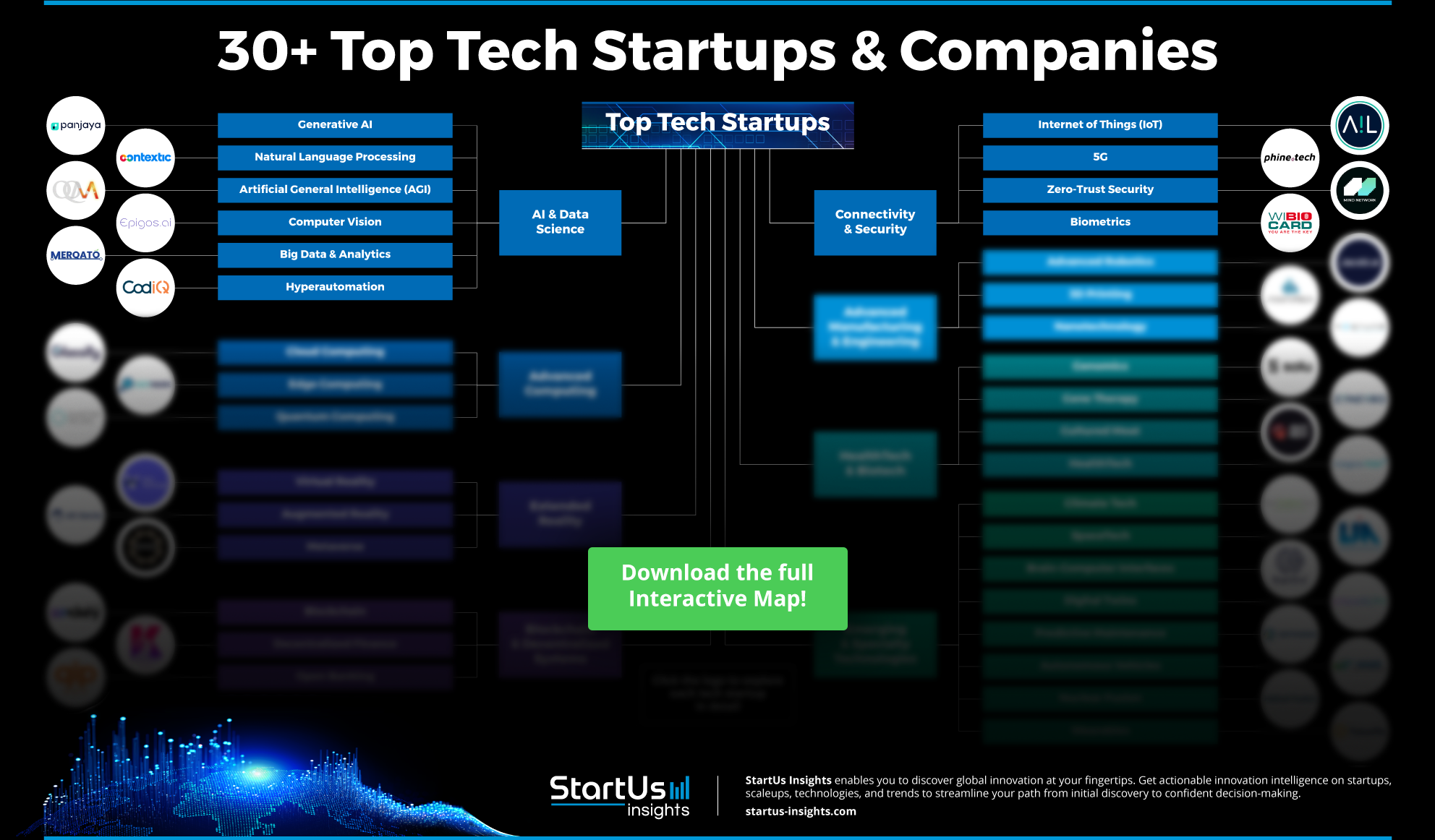
6. Cloud Computing

Cloud computing enables real-time collaboration, data storage, and access to critical information from any location. This facilitates communication between project teams, ensures everyone has up-to-date information, and reduces errors. Cloud-based project management tools also improve scheduling, resource allocation, and cost control. By integrating with digital construction practices, cloud computing enhances the efficiency of building processes through automated workflows and intelligent data management.
3 Practical Use Cases of Cloud Computing in Construction
- Collaborative Design: Multiple stakeholders work on the same project files in real-time and this improves coordination, reduces errors, and speeds up the design process.
- Centralized Project Management: Project management via the cloud provides real-time access to project data, schedules, and documents. This enhances communication, ensures transparency, and enables efficient decision-making across project phases.
- BIM: Cloud-based BIM enables integrated, real-time collaboration on 3D models to improve accuracy, reduce rework, and enhance construction process efficiency.
Startup to Watch: Veristart Technologies
Canadian startup Veristart Technologies puts construction equipment keys in the cloud to reduce risk, cost, and downtime. It offers a cloud and mobile app solution for equipment access control, enabling real-time control over who can operate the equipment. This eliminates equipment theft and improves site safety as the app centralizes operator data, training credentials, and equipment information. Veristart Technologies thus empowers construction site owners to enhance security, streamline operations, and ensure safer working environments.
7. Connectivity Technologies

Advanced connectivity improves data sharing, communication, and automation across job sites. For this, construction businesses leverage 5G, cellular CCTV cameras, access control card readers, and more. These technologies facilitate real-time monitoring of equipment, materials, and personnel, which improves safety, efficiency, and decision-making. Moreover, 5G provides quick access to large files like CAD drawings and reduces the time lag between sites and remote workers.
3 Practical Use Cases of Connectivity Technologies in Construction
- Connected Job Sites: Enable real-time communication and data sharing to improve coordination and productivity by ensuring timely updates and collaboration among all project stakeholders.
- Equipment Telematics: Provides real-time monitoring and management of construction machinery to ensure optimal performance and preventive maintenance. This reduces downtime, lowers maintenance costs, and extends equipment lifespan.
- Safety Monitoring: Enables real-time tracking of worker locations and site conditions. This proactive approach reduces accidents, improves response times, and ensures compliance with safety regulations.
Startup to Watch: Astrox Aerospace
Indian startup Astrox Aerospace develops 5G-powered drones for construction applications. The company’s AX-AI module offers long-range beyond visual line of sight (BVLOS) operations with real-time video streaming and AI-enabled flight planning. The AX-Orion Pro drone provides GPS-based mapping and surveying for construction sites, infrastructure projects, and urban planning.
8. Internet of Things

The Internet of Things connects devices, machinery, systems, and people to create smarter and more efficient job sites. It enables real-time data collection that allows construction managers to monitor equipment, track materials, and ensure worker safety. Further, IoT-powered data enables predictive maintenance and process automation that optimize resource allocation, reduce downtime, and prevent costly delays. This also improves communication and collaboration among project teams, enhancing decision-making and project outcomes.
3 Practical Use Cases of IoT in Construction
- Structural Health Monitoring: IoT sensors continuously monitor the structural health of buildings and infrastructure to detect issues early. This proactive maintenance approach extends the lifespan of structures and ensures safety.
- Equipment Utilization: IoT devices track equipment usage, and optimize utilization and maintenance schedules. It reduces downtime and costs while enhancing overall project efficiency.
- Energy Management: IoT-enabled energy management systems (EMS) monitor and control energy consumption in real time. This improves energy efficiency, reduces waste, and lowers operational costs in construction projects.
Startup to Watch: DevLabs
Danish startup DevLabs builds environmental sensor solutions for real-time monitoring of construction sites. The company’s IoT device, DGEM, collects environmental data, and the IoT platform, DASH, provides real-time data management. DevLabs enhances operational efficiency and safety by emphasizing environmental compliance and operational insight.
9. Advanced Robotics

In the construction industry, robotics is automating tasks, enhancing precision, reducing costs, speeding up projects, enabling complex designs, and ensuring consistent quality. Construction companies deploy robotic systems to automate bricklaying, concrete pouring, and site inspections. Robotics also enhances safety by taking over dangerous tasks such as demolition and exposure to harmful substances, minimizing workplace accidents.
3 Practical Use Cases of Robotics in Construction
- Automated Surveying: Autonomous drones and ground robots collect data and reduce human error and operational costs. These systems integrate AI to analyze real-time data and provide terrain mapping and topographic details for construction planning.
- Bricklaying Robots: Autonomous robots lay bricks with consistent accuracy and minimal waste. This minimizes labor costs and enhances safety.
- Prefabrication: Advanced robotics automates the production of building components in controlled factory environments. This approach speeds up on-site assembly and leads to faster project completion and cost savings.
Startup to Watch: Cosmic Robotics
US-based startup Cosmic Robotics develops the Cosmic-1, an autonomous construction robot. The robot operates on a modular platform, utilizing rugged components and software for construction tasks. Cosmic-1 features a multi-modal perception system, aerospace-grade aluminum structures, and sub-centimeter localization capabilities. The robot’s electric platform ensures efficient and sustainable operations. The startup’s Cosmic-OS operating system enables real-time tracking, issue resolution, and project management. These solutions enhance efficiency and accuracy in construction.
10. Blockchain

Blockchain enhances transparency, security, and efficiency in construction project management and contractual agreements. It decentralizes data, ensures immutable records, and streamlines procurement, payments, and compliance processes. This reduces the risk of fraud and disputes. Additionally, smart contracts automatically execute agreements to provide a transparent and tamper-proof system for transactions and agreements. This improves trust between stakeholders.
3 Practical Use Cases of Blockchain in Construction
- Automated Transactions: Blockchain enables automated transactions through smart contracts, which trigger payments when predefined conditions are met, ensuring secure and transparent payments. It reduces the need for intermediaries and minimizes transaction delays.
- Supply Chain Management: Real-time tracking and immutable records of materials increase transparency, reduce fraud, and improve the efficiency of procurement processes in construction supply chains.
- Project Documentation: Blockchain also secures project documentation by creating tamper-proof, verifiable records of all project-related documents. This ensures data integrity and enhances trust among stakeholders.
Startup to Watch: Arcartera
Hong Kong startup Arcartera develops blockchain solutions for the architecture, engineering, and construction (AEC) industry. It utilizes distributed ledger technology to ensure secure, immutable records of project data and streamline collaboration among stakeholders. The startup’s platform features smart contracts for automated workflows, real-time tracking of materials, and verification of compliance with regulatory standards. Arcartera reduces administrative overhead and mitigates risks associated with data tampering, along with enhancing project transparency and efficiency.
Outlook for the Construction Industry
Patents & Grants
Innovation remains a cornerstone, evidenced by over 34000 patents and support from 2000+ grants.
For more actionable insights, download our free Construction Innovation Report.
Investment Landscape
Investment in the sector is dynamic, with an average investment value of USD 17.3 million per round. Top investors, including Y Combinator, Antler, Pi Labs, Techstars, and Accel, collectively contribute to the sector’s growth. They play an essential role across various funding types, including seed, early-stage VC/series A, pre-seed, angel, and M&A, driving innovation and expansion in the industry.
Global Footprint
The industry’s global footprint is extensive, with key hubs in the US, Germany, the UK, Canada, and Australia, and major cities like Sydney, London, New York City, Melbourne, and Singapore.
Don’t Miss Out on the Latest Construction Innovations
Ready to leverage the latest construction technology solutions shaping the future? With StartUs Insights, you gain quick and easy access to over 4.7 million startups, scaleups, and tech companies, along with 20,000 emerging technologies and trends. Our AI-powered search and real-time database provide exclusive solutions that set you apart from the competition.
Industry giants like Samsung, Nestlé, and Magna trust our innovation intelligence tools to lead trends, optimize operations, and uncover new market opportunities. Benefit from our unmatched data, comprehensive industry views, and reliable insights to drive strategic decision-making.
As Doka’s Product Manager for Digital Services, Stefan Huber, attests, “StartUs Insights’ experience, expertise, and flexibility results in a high number of relevant applications for our Startup Call. Additionally, the team continuously keeps us updated and illustrates the progress made during our partnership. We look forward to collaborating again soon!”
We look forward to helping you achieve similar success. Get in touch to learn how our tailored discovery options can accelerate your innovation journey.
Discover All Construction Technologies & Startups!
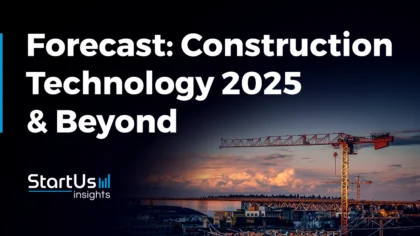
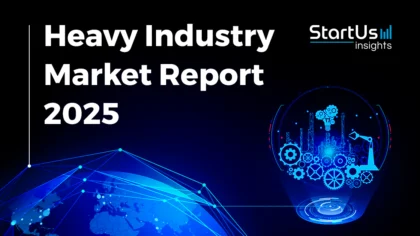
![AI in Construction: A Strategic Guide for Industry Leaders [2025-2030]](https://www.startus-insights.com/wp-content/uploads/2025/04/AI-in-Construction-SharedImg-StartUs-Insights-noresize-420x236.webp)
